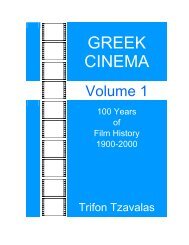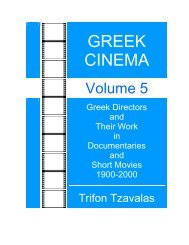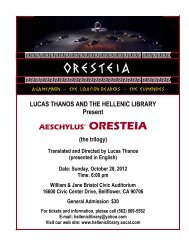- Page 1 and 2: GREEK CINEMA Volume 3 Documentaries
- Page 3: Dedicated to the memory of my paren
- Page 7: ACKNOWLEDGMENTS I would like to exp
- Page 11 and 12: It took many years for the Greek pr
- Page 13 and 14: the feature documentary Greece Tou
- Page 15 and 16: sentimental story, the leading acto
- Page 17 and 18: One more noteworthy short documenta
- Page 19 and 20: The Critics Award went to Fotis Mes
- Page 21 and 22: him, and after having conversation
- Page 23 and 24: lived in these areas for twenty-fiv
- Page 25 and 26: Director” was divided between dir
- Page 27 and 28: were Mani, directed by Ermis Vellop
- Page 29 and 30: theater were also presented the sho
- Page 31 and 32: Its plot starts with the first anni
- Page 33: Kokkinopoulos received the fourth p
- Page 37 and 38: Noteworthy in 1982 is the feature d
- Page 39 and 40: To Onomamou Ene Anna (My name is An
- Page 41 and 42: uses the technique of animation to
- Page 43: tablishment of the Greek Film Cente
- Page 46 and 47: daily activities of Karystos in the
- Page 48 and 49: 1: Kerkira (Corfu); (short document
- Page 50 and 51: Photography/ Cameraman/ Editor: Rou
- Page 52 and 53: sos Koundouros; Editor: Roussos Kou
- Page 54 and 55: Producer: Carl Forman; Director: Ni
- Page 56 and 57: "Your Twinkling Eyes" and "Serenade
- Page 58 and 59: documentary about the city of Naupl
- Page 60 and 61: Narrator: Takis Natsoulis. A politi
- Page 62 and 63: opoulos; Music: Evgenia Hatzikou. (
- Page 64 and 65: aphy/Cameraman: Vasilis Maros; Edit
- Page 66 and 67: the town of Lagada and Saint Helen.
- Page 68 and 69: 20: The Audition (short movie); Pro
- Page 70 and 71: Paul"; Directors: Eraklis Papadakis
- Page 72 and 73: tors/Scriptwriters: Demetris (Takis
- Page 74 and 75: lis Siropoulos; Sound Recording: Gi
- Page 76 and 77: Panayiotopoulos; Director of Photog
- Page 78 and 79: as; Director of Photography/Cameram
- Page 80 and 81: and Information; Director/Scriptwri
- Page 82 and 83: in newspapers, government statistic
- Page 84 and 85:
tor of Photography/ Cameraman: Eric
- Page 86 and 87:
1: Enas Iros Me To Mnimoskopio (Gri
- Page 88 and 89:
19: Itan Mera Giortis (It Was a Day
- Page 90 and 91:
los Kazan, Kate Imbrohori. (35 mm,
- Page 92 and 93:
om Hurt Mother by Pink Floyd. (35 m
- Page 94 and 95:
ic Group Kino; Director of Photogra
- Page 96 and 97:
Scriptwriter/ Director of Photograp
- Page 98 and 99:
panikolaou; Music: Fivos Ekonomidis
- Page 100 and 101:
Kelaidonis. Its subject is how a mo
- Page 102 and 103:
Margkas; Editors: Lakis Papastathis
- Page 104 and 105:
Editor: Theodoros Adamopoulos. It i
- Page 106 and 107:
tos Magkos; Assistant Director: Gio
- Page 108 and 109:
28: Ta Farmaka (The Drugs); (color)
- Page 110 and 111:
tor of Photography/Cameraman/ Edito
- Page 112 and 113:
poulos. Tells the story of a desert
- Page 114 and 115:
Raftopoulos; Sound Recording: Chara
- Page 116 and 117:
29: E Endos Ton Tichon (Those insid
- Page 118 and 119:
of an army sergeant and a girl in t
- Page 120 and 121:
71: Psevesthisis (Illusions); (shor
- Page 122 and 123:
15: Panayis Lelonis (color); (short
- Page 124 and 125:
36: O Hthesinos Fovos (Yesterday’
- Page 126 and 127:
Eleftherios Pavlopoulos; Editor: Yi
- Page 128 and 129:
tor/Scriptwriter: Demetris Sofianop
- Page 130 and 131:
of Photography/ Cameraman: Giorgos
- Page 132 and 133:
48: Anastenarides (Fire-Walkers); (
- Page 134 and 135:
69: Also Sprach Amerika (I Also Spe
- Page 136 and 137:
5: Anogia 79 (color); (short docume
- Page 138 and 139:
22: O Tihos (The Wall); (short movi
- Page 140 and 141:
duced by Anticancer Institute; Dire
- Page 142 and 143:
Athanasios Arvanitis; Narrator: Dem
- Page 144 and 145:
tography/Cameraman/Editor: Sakis Ma
- Page 146 and 147:
duced by Cine video and Channel 4;
- Page 148 and 149:
vayias; Commentator: Dionisis Kaska
- Page 150 and 151:
49: Dimosia Erga Stin Ellada (Publi
- Page 152 and 153:
70: Tris Amarties (Three Sins); (sh
- Page 154 and 155:
Cameraman: Philippos Koutsaftis; Ed
- Page 156 and 157:
emembers things from her childhood.
- Page 158 and 159:
52: Post Restant Omonia (Hold the M
- Page 160 and 161:
Produced by Ministry of Culture; Di
- Page 162 and 163:
25: Nellys (color); (short document
- Page 164 and 165:
tary): Produced by Greek Film Cente
- Page 166 and 167:
5: Surrealistic Happening (color);
- Page 168 and 169:
Babounis, Nikos Kamtsis. The life o
- Page 170 and 171:
43: Diasosi Akropolis (Preservation
- Page 172 and 173:
Demetris Arvanitis; Editor: Yianna
- Page 174 and 175:
Yannis Lapatas; Director of Photogr
- Page 176 and 177:
8: Osia Maria E Egiptia (Saint Mary
- Page 178 and 179:
tombstones of the First Cemetery of
- Page 180 and 181:
of Ptolemaic influence in the ruins
- Page 182 and 183:
tion; Director: Demetris Vernikos.
- Page 184 and 185:
81: Kafenion To Ariston (Best Cafe)
- Page 186 and 187:
pakas; Editor: Christos Sadatsoglou
- Page 188 and 189:
gos Hondrokostas; Director of Photo
- Page 190 and 191:
tography/ Cameraman/Editor: Alexis
- Page 192 and 193:
42: Eva (color); (short movie); Pro
- Page 194 and 195:
59: Schedio Documenter (Sketch Docu
- Page 196 and 197:
las; Scriptwriters: Takis Demetrako
- Page 198 and 199:
(short movie); Producer/ Director/S
- Page 200 and 201:
madios Apostolopoulos, Nikodimos Bi
- Page 202 and 203:
Cameraman: Takis Venetsanakos; Edit
- Page 204 and 205:
Recording: Dinos Kittou and Antonis
- Page 206 and 207:
Christos Gartaganis and Lambros Kou
- Page 208 and 209:
81: O Epomenos Tou Proegoumenou (Th
- Page 210 and 211:
tography/ Cameraman/ Editor: Panayi
- Page 212 and 213:
tor: Panos Kaloudas; Director of Ph
- Page 214 and 215:
TAP; Director/ Scriptwriter: Tasos
- Page 216 and 217:
Greek Film Center and Egokeros; Dir
- Page 218 and 219:
64: Strogillo (Circular); (color);
- Page 220 and 221:
is; Set Designer: Tasos Zaferopoulo
- Page 222 and 223:
Poulidis; Editor: Filitsa Anagnoste
- Page 224 and 225:
121: Labyrinth, (color); (short doc
- Page 226 and 227:
Death in Folk-Songs); (color); (sho
- Page 228 and 229:
das. Examines the mysteries and str
- Page 230 and 231:
ing: Panos Petronikolas; Starring:
- Page 232 and 233:
The story is an adaptation from a s
- Page 234 and 235:
satire on a political speech and th
- Page 236 and 237:
in Mount Lykaion near Olympia. (16
- Page 238 and 239:
122: Pat, (color); (short movie); P
- Page 240 and 241:
9: Pedikes Anamnisis: Ta Vivlia Tis
- Page 242 and 243:
searching for the old, lost cinema.
- Page 244 and 245:
the folklore traditions of goblins.
- Page 246 and 247:
64: To Hnoudi Tis Nihtas (The Night
- Page 248 and 249:
tris Niahas. It refers to the relat
- Page 250 and 251:
Alekos Dragonas. The young heroine
- Page 252 and 253:
113: Nihterini Vardia (Night Shift)
- Page 254 and 255:
133: Logiki Ton Thimaton (Victim’
- Page 256 and 257:
152: Triti Stasi Pangratiou (Pangra
- Page 258 and 259:
investing in an industrial town. Wi
- Page 260 and 261:
About the reaction of people if the
- Page 262 and 263:
43: Spitakia Elafrou Tipou (Small H
- Page 264 and 265:
61: Movie Love (color); (short movi
- Page 266 and 267:
Psihogios, Yannis Spiliopoulos, Dia
- Page 268 and 269:
lou; Set Designer/Costumes: Anna Ma
- Page 270 and 271:
Klaus Naumann; Editor: Andreas Tres
- Page 272 and 273:
the eyes of the poet Egonopoulos. (
- Page 274 and 275:
70: Andapokrisi (Response); (color)
- Page 276 and 277:
Extracts of Yannis Christou archive
- Page 278 and 279:
Perkunder; Starring: Nathalie Stein
- Page 280 and 281:
space in their home is too small fo
- Page 282 and 283:
pen to a woman when she is just goi
- Page 284 and 285:
Starring: Christos Kikidis. A psych
- Page 286 and 287:
81: Mia Periergi Tenia (A Strange M
- Page 288 and 289:
Production Manager: Kleoni Flessa;
- Page 290 and 291:
come to Athens with tools only thei
- Page 292 and 293:
ie); Produced by I.A.T.C., Buchares
- Page 294 and 295:
otsis; Starring: Mirtio Alikaki, An
- Page 296 and 297:
Tarnanas; Sound Recording: Yannis K
- Page 298 and 299:
chase him, but he is not willing to
- Page 300 and 301:
4: Meri -Amen (Anazitisi Se Tria Me
- Page 302 and 303:
characters who hang out at the main
- Page 304 and 305:
aphy/Cameraman: Platon Andronidis;
- Page 306 and 307:
Photography/Cameraman: Odysseas Pav
- Page 308 and 309:
love. But they got lost in the crow
- Page 310 and 311:
Ioannidis; Sound Recording: Doros E
- Page 312 and 313:
86: Ekogeniaki Photography (Family
- Page 314 and 315:
108: Gospel According to a Child (s
- Page 316 and 317:
Henning Harms; Starring: H. Lehner,
- Page 318 and 319:
aphy/Cameraman: Petros Koumoundouro
- Page 320 and 321:
Demetris Schostakowitch. A person s
- Page 322 and 323:
Director of Photography/ Cameraman:
- Page 324 and 325:
76: Castrato (color); (short movie)
- Page 326 and 327:
School; Director/Scriptwriter/Direc
- Page 328 and 329:
and a young girl arrive in Athens f
- Page 330 and 331:
Gimosoulis and Athina Sakellariou;
- Page 332 and 333:
Katerina Maragoudaki; Editor: Ioann
- Page 334 and 335:
yone strives for survival. (16 mm,
- Page 336 and 337:
63: Mia Mikri Istoria Gia To Yelio
- Page 338 and 339:
Skarmoutsos; Director of Photograph
- Page 340 and 341:
tography/Editor: Vasiliki Katsarou;
- Page 342 and 343:
her. The slovenly and sad looking w
- Page 344 and 345:
guage...Dionisios Solomos); (color)
- Page 346 and 347:
les in his relationship with girl.
- Page 348 and 349:
adafillidis); Director/ Scriptwrite
- Page 350 and 351:
51: Aqua Vitae (color); (short movi
- Page 352 and 353:
hou; Supporting Cast: Antonis Chari
- Page 354 and 355:
padakis; Music: Harris Elektron; St
- Page 356 and 357:
Nikos Leros; Director/Scriptwriter:
- Page 358 and 359:
Spiliopoulou; Set Designer: Demetri
- Page 360 and 361:
Abato, Kerry Johnston, Dick Stampol
- Page 362 and 363:
Andreas Tarnanas; Starring: Vivi Pa
- Page 364 and 365:
lou; Starring: Evangelos Mourikis,
- Page 366 and 367:
Periplus; Producer: Thanos Lambropo
- Page 368 and 369:
aphy/Cameraman: Giorgos Frentzos; E
- Page 370 and 371:
Richards, Barbara-Ann Winter. A lad
- Page 372 and 373:
41: Odos Sofokleous (Sophocleous St
- Page 374 and 375:
56: Nausea (color); (short movie);
- Page 376 and 377:
1961 Short Movies, Feature and Shor
- Page 378 and 379:
5: Anamnisis Apo Tin Ellada (Memori
- Page 380 and 381:
8: Anamoni (Waiting); (short movie)
- Page 382 and 383:
participated in the Melbourne and B
- Page 384 and 385:
1: Ta Engenia (The Opening Night);
- Page 386 and 387:
9: Politia (City); (short documenta
- Page 388 and 389:
17: Yia Liges Mono Parastasis (For
- Page 390 and 391:
2: E Grammi (The Line); (short movi
- Page 392 and 393:
Cinema Critics Award (Forum of Youn
- Page 394 and 395:
1: Karaghiozis (feature documentary
- Page 396 and 397:
New Delhi, and Paris (A Greek Direc
- Page 398 and 399:
21: Mia Zoe Se Thimame Na Fevyis (M
- Page 400 and 401:
11: O Giorgos Apo Ta Sotirianika (G
- Page 402 and 403:
has; participated in the 12th Stude
- Page 404 and 405:
9: Zahos O Mazohas (Zahos the Masoc
- Page 406 and 407:
16: To Orama (The Vision); (short d
- Page 408 and 409:
Best Short Movie with Theme: To Die
- Page 410 and 411:
To Elliniko Kinoumeno Shedio (The G
- Page 412 and 413:
8: Lesbos 1980 (short documentary);
- Page 414 and 415:
in the Sofia Film Festival and rece
- Page 416 and 417:
10: Aftos Pou Perisozi To Metalo So
- Page 418 and 419:
Eki Perpatise O Christos (Jesus Wal
- Page 420 and 421:
12: Post Restant -Omonia (Hold the
- Page 422 and 423:
11: Alli Mia Mera (One More Day); (
- Page 424 and 425:
the Festival of Cinema Schools of M
- Page 426 and 427:
2: Axelere (short documentary); Dir
- Page 428 and 429:
20: Eva (short movie); Director: Ma
- Page 430 and 431:
7: Persephone (short movie); Direct
- Page 432 and 433:
Brussels Imaginary Cinema Film Fest
- Page 434 and 435:
6: Ke Egeneto Fos (And It Became Li
- Page 436 and 437:
PEKK Award (Pan-Hellenic Cinema Cri
- Page 438 and 439:
1: Santorini (short documentary); D
- Page 440 and 441:
30: Ta Mousika Organa Tis Elladas (
- Page 442 and 443:
16: Min Taezete Tin Arkouda (Do Not
- Page 444 and 445:
22: El Barti (short documentary); D
- Page 446 and 447:
35: E Peripetia Enos Vlemmatos (The
- Page 448 and 449:
40: Erotiki Istoria (A Love Story);
- Page 450 and 451:
14: Ta Marmara (The Marbles); (shor
- Page 452 and 453:
1: To Kinigi Tis Papias (Duck Hunti
- Page 454 and 455:
3: Paralisia (Profligacy); (short m
- Page 456 and 457:
23: Tunnel (short documentary); Dir
- Page 458 and 459:
Foundation Award, Cine Eagle Award,
- Page 460 and 461:
3: E Agapimene (The Beloved Ones);
- Page 462 and 463:
the Best Documentary Award. It also
- Page 464 and 465:
2: Eros Iros (Love Hero); (short mo
- Page 466 and 467:
lou received the Best Film Award by
- Page 468 and 469:
2: Sta Prosopa Tis Anatolis Kimate
- Page 470 and 471:
9: Aron! Aron! (Let’s go); (short
- Page 472 and 473:
Provence (France), Film Festivals.
- Page 474 and 475:
7: To Schedio (The Sketch - release
- Page 476 and 477:
3: Alexandroupolis (short documenta
- Page 478 and 479:
4: Genesis; (short movie); Director
- Page 480 and 481:
Festival, (Grimstad, Norway), Sao P
- Page 482 and 483:
6: O Danny Mails Fevgi Apo to Spiti
- Page 484 and 485:
Wilhelm -Murnau Award, in Wiesbaden
- Page 486 and 487:
1: Ela Na Sou Po (Come over to Tell
- Page 488 and 489:
3: O Elios Ekeye Poli (The Sun Was
- Page 490 and 491:
eceived Cine Gold Eagle Award. In D
- Page 492 and 493:
490
- Page 494 and 495:
1988: A Day Shooting Women (short m
- Page 496 and 497:
Kostas Maheras 1995: Imerologio Kat
- Page 498 and 499:
496
- Page 500 and 501:
498
- Page 502:
Advance Praise for THE HISTORY OF G








